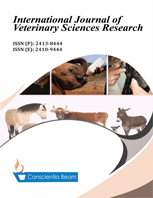Changes in antibody titres and comparative efficacy of some unconventional remedies in mitigating the effects of infectious bursal disease virus infection in pullet chicks
DOI:
https://doi.org/10.18488/ijvsr.v8i1.3358Abstract
Unconventional remedies are used by farmers against infectious bursal disease (IBD). This study assessed changes in IBD antibody titres and efficacy of some unconventional remedies used by farmers against IBD. Day old ISA brown pullets were assigned into eight groups (A-H) and inoculated with a very virulent IBD virus (vvIBDV) at 21 days of age as follows; group A - administered aqueous leaf extract of Kaya senegalensis (KS); B, C, D, E, and F administered remedies designated as SEV, ENP, ASMS, DLP, and OVX, respectively; G, and H were negative, and positive control, respectively. Changes in IBD antibody (Ab) titres, clinical signs, morbidity and mortality rates, gross lesions, weights and organ ratios of bursal (BF), spleen (S) and thymus (T) were assessed. There were protective levels of Ab in groups of chicks at 2 and 7 days of age. SEV and ASMS potentiated Ab response to vvIBDV; SEV mitigated the severity of clinical signs, morbidity and mortality rates, gross lesions and changes in body and BF weights and SBR; KS clinical signs, morbidity and mortality rates, BF weight and BBR; ENP morbidity rate, spleen and thymus weights and TBR; ASMS thymus weight and TBR; DLP gross lesions, BF weight and BBR; OVX body, spleen weights and SBR. The remedies demonstrated varied actions against VVIBDV infection. SEV and KS leaves could be administered at the onset of IBD outbreak and before IBD vaccination. Processing of KS leaves to reduce concentration of antimetabolites is recommended.

